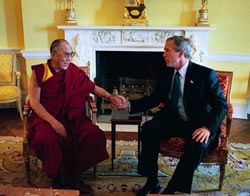
The Dalai Lama is Welcomed to the White House by President Bush on September 10, 2003. (White House)
The Dalai Lama arrived in the U.S. capital on September 8 to begin a four-day schedule of meetings with U.S. Government leaders and policymakers.
The Dalai Lama’s last Washington visit was in May 2001, making this his first opportunity to meet with U.S. leaders since the renewed contact between his envoys and Chinese government officials, credited in part to sustained U.S. interest in the dialogue process conveyed consistently to Chinese leaders. To date, the Dalai Lama’s envoys have made two trips to China and Tibet, in September 2002 and May-June 2003, following an impasse in direct contact of nearly a decade.
A Report on Tibet Negotiations issued from the White House to the Congress shortly before the envoys’ second trip detailed steps taken by the President and Secretary of State to encourage the Chinese government to enter into a dialogue with the Dalai Lama or his representatives leading to a negotiated agreement on Tibet.
While the report stressed that “questions surrounding Tibet and its relationship to Chinese authorities in Beijing should be resolved by direct dialogue between the Tibetans and the Chinese,” it also made clear that the “lack of resolution of these problems…will be a stumbling block to fuller political and economic engagement with the United States”
Meetings with President Bush and Secretary of State Powell were said to have reflected their strong interest in the Dalai Lama’s evaluation of the renewed contact between the Chinese and Tibetans and possible next steps, including a third trip by the Dalai Lama’s envoys.
Discussions reportedly included commitments from the U.S. Government and the Dalai Lama to seek a mutually beneficial solution for Chinese and Tibetans arrived at through dialogue and based on autonomy for Tibetans, and whether a trip by the Dalai Lama to China or Tibet might be plausible.
Throughout his Washington visit The Dalai Lama forecast a lengthy and difficult process of negotiations and asked that the United States concurrently focus its attention on three immediate concerns:
- unchecked Chinese emigration into Tibet,
- the economic marginalization of Tibetans, and
- the impact of resource extraction and development on Tibet’s fragile environment.
Chinese policies that had attempted to grapple with these kinds of negative impacts were identified and discussed, and both the President and Secretary were very well briefed on the situation in Tibet.
The meetings occurred amid the usual official complaints from Beijing who urged the United States “to stop using the Tibet issue to interfere with China’s internal affairs, so as to not harm China-U.S. relations.”
Nonetheless, the Dalai Lama was received at the State Department and White House with diplomatic courtesies, which included a warm White House welcome by First Lady Laura Bush, and administration officials did not shy away from formal and informal conveyances of friendship and solidarity with the Dalai Lama and his efforts.
Below is part of the September 10, 2003, transcript from the White House spokesman regarding the Dalai Lama’s meeting with President Bush:
Press Briefing:
Mr. McClellan: Good afternoon, everybody. Earlier today, the President met with His Holiness, the Dalai Lama, you heard from the Dalai Lama outside. This was their second meeting to discuss Tibet. The President reiterated our strong commitment to support the preservation of Tibet’s unique religious, cultural and linguistic identity, and the protection of the human rights of all Tibetans.
The President also declared his strong support for the Dalai Lama’s commitment to the dialogue with China. The President said he would seek ways to encourage China to continue the dialogue on a substantive basis, and expressed his hope that the Chinese government would respond favorably.
The President and the Dalai Lama agreed on the importance of strong and constructive U.S.-China relations.

